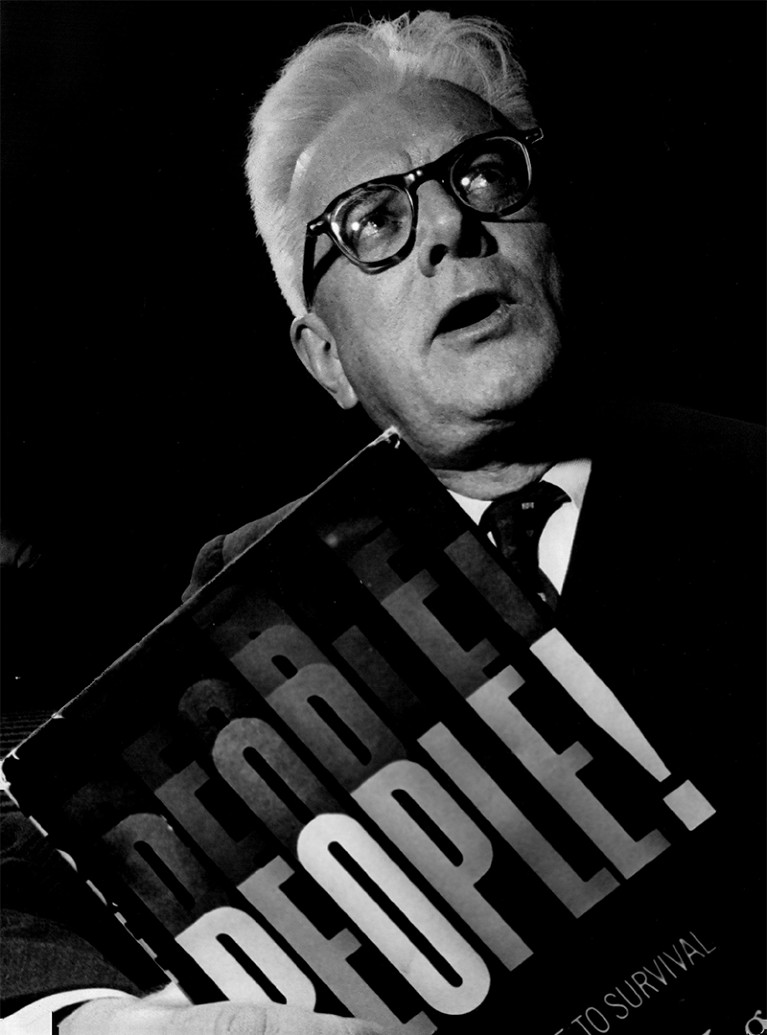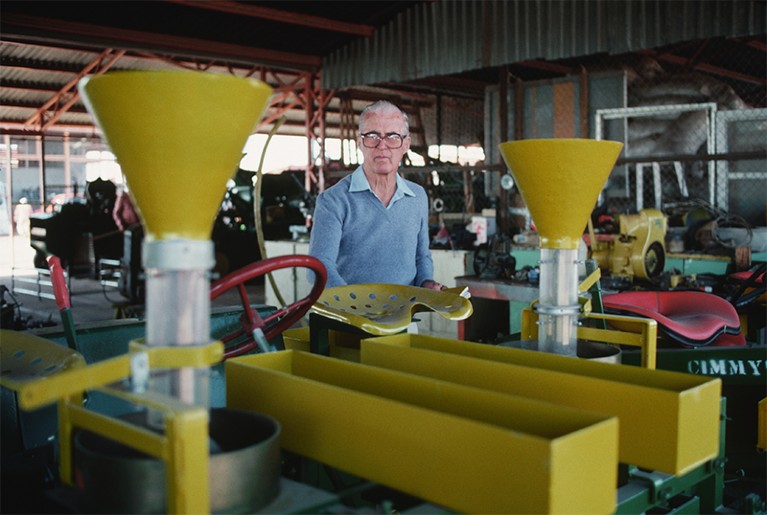
Ecologist William Vogt warned of the dangers of dwindling resources.Credit: Denver Post via Getty.
The Wizard and the Prophet: Two Remarkable Scientists and Their Dueling Visions to Shape Tomorrow’s World Charles C. Mann Knopf: 2018.
Our species has had an amazingly successful run. Billions of people now live in environments radically transformed to suit human needs and wants. But humanity’s future is far from guaranteed. How will we meet the looming challenges of the twenty-first century? We can work even harder to master the planet with technological ingenuity. Or we might need to accept that our desires can’t be unlimited, and see ourselves as citizens of a larger-than-human community, rather than as world conquerors. We can’t do both, science writer Charles Mann argues in The Wizard and the Prophet, an effort to assess which path holds the more promise.
To dramatize the two options, Mann contrasts the work of agronomist Norman Borlaug (the Wizard of his title) with that of ecologist William Vogt (the Prophet). In 1970, Borlaug won the Nobel Peace Prize for developing high-yield varieties of wheat that launched the Green Revolution. Along with agricultural chemicals and irrigation systems, Borlaug’s seeds led to a sharp rise in productivity in Mexico, India and other developing countries, particularly in the 1960s. Vogt’s 1948 best-seller Road to Survival warned that rising population and declining resources spelt global catastrophe. Whereas Borlaug hoped to free humanity from the constraints of nature, Vogt called for a new environmental consciousness.
Although few today would self-identify as followers of Borlaug or Vogt, the heart of Mann’s book asks how people he considers their intellectual heirs propose to deal with climate change and to provide food, water and energy for a projected global population of 10 billion (or more) by 2050. His Wizard camp ranges from biotech boosters to advocates of geoengineering. His Prophets include the authors of The Limits to Growth (Universe, 1972), along with the small-is-beautiful advocates of organic agriculture and solar power.
The structure of The Wizard and the Prophet reminded me of John McPhee’s brilliant Encounters with the Archdruid (Farrar, Straus and Giroux, 1971). That book explored the implications of the environmental movement by arranging confrontations between David Brower — long-time leader of the conservationist Sierra Club and founder of Friends of the Earth — and three presumed foes. Brower debates a mining engineer, a resort developer and a dam builder (the latter, on a raft trip on a wild stretch of the Colorado River). McPhee respected all four, and was masterful at challenging stereotypes. Readers were free to decide who had won the debates.

Agronomist Norman Borlaug used technology to boost material progress in the face of natural constraints.Credit: Ted Streshinsky/Corbis via Getty.
Unfortunately, Mann’s study doesn’t measure up to McPhee’s classic. It is flawed in many ways, most notably in its lack of even-handedness. Mann writes that he was a Vogtian when young, later became a Borlaugian and is now torn — but I don’t see that ambivalence in the text. Mann indicts Vogt as a failure who wasted precious time by leading people down a dead end. He considers Borlaug a saviour, even though the Green Revolution had unfortunate social and environmental consequences, such as a growing concentration of land ownership and pollution of waterways through overuse of pesticides. Mann also stacks the deck by ignoring problems with the Borlaugian approach and neglecting compelling elements of the Prophetic tradition.
At root, the differences between Borlaug and Vogt were ideological, not scientific. Borlaug accepted the mainstream values of his time and place — the American dream of material progress. Vogt didn’t; like all prophets, he was a critic. He called for people to reappraise their place in the world: to think ecologically about everything from what we consume to how we understand history. He questioned whether “that sacred cow Free Enterprise” could be environmentally sustainable. And he advocated population control, which went against many people’s religious views and humanist ideals. Aside from decrying the latter notion, Mann engages with none of these ideas.
Instead, Mann turns the ideological divide into a dispute about technological visions, the hard and soft paths (a dichotomy he appropriates from physicist Amory Lovins). Wizards favour ‘hard’, sophisticated, capital-intensive, top-down methods of ensuring adequate food, water and energy, Mann argues. Prophets believe in simpler, decentralized, ‘soft’ solutions. But that definition is Borlaugian. It assumes that the goal is to meet ever-greater demand for natural resources — a premise that most Vogtians reject, because they argue that we need to moderate our desires, not just find less destructive ways to slake them. Even if Mann considers that argument naive, fairness demands giving it a hearing.
Mann also caricatures proponents of the soft path — particularly Lovins. Lovins is as can-do as any techhead; he’s not a counter-cultural guru. Yet he does warn in Soft Energy Paths (Friends of the Earth International, 1977) that hard technologies lead to undemocratic concentrations of power, as major oil companies have proved. He is also a leader in making the market greener, as a consultant to corporations and as co-author of Natural Capitalism (Little, Brown, 1999). Although Mann dismisses him as a retro activist, Lovins would be a worthy antagonist for any Borlaugian.
And it’s to the Borlaugians that Mann is most generous. He considers the evidence for the safety of genetically engineered crops as compelling as the scientific consensus on climate change. He holds out hope for nuclear power. And he barely acknowledges that history provides countless reasons for anxiety about unintended consequences of technology. From plastics to chemical pesticides, many twentieth-century miracles have done harm as well as good. Even some technology boosters admit that surprises are inevitable, although they remain undaunted. As the automotive pioneer Charles Kettering liked to say: “The price of progress is trouble, and I don’t think the price is too high”.
Mann asserts that those who lean towards Vogt’s world view can’t prove that we’ll hit planetary limits. But the heirs of Borlaug can’t prove that they’ll avoid making a mistake that undermines the ecological or planetary foundations of civilization. Where does that leave us? The Wizards have had most of the momentum since the Enlightenment. The Prophets keep the Wizards from overreaching, and challenge us to probe what we really value. We need to listen carefully to both.

 Sustainability: Laying waste
Sustainability: Laying waste
 Circular economy: Getting the circulation going
Circular economy: Getting the circulation going
 Sustainability: The launch of Spaceship Earth
Sustainability: The launch of Spaceship Earth






